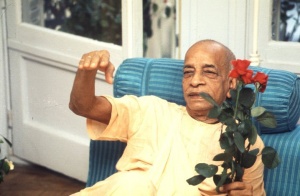SB 6.13.2: Difference between revisions
No edit summary |
(Vanibot #0054 edit - transform synonyms into clickable links, which search similar occurrences) |
||
| Line 23: | Line 23: | ||
<div class="synonyms"> | <div class="synonyms"> | ||
''deva'' | ''[//vanipedia.org/wiki/Special:VaniSearch?s=deva&tab=syno_o&ds=1 deva]'' — demigods; ''[//vanipedia.org/wiki/Special:VaniSearch?s=ṛṣi&tab=syno_o&ds=1 ṛṣi]'' — great saintly persons; ''[//vanipedia.org/wiki/Special:VaniSearch?s=pitṛ&tab=syno_o&ds=1 pitṛ]'' — the inhabitants of Pitṛloka; ''[//vanipedia.org/wiki/Special:VaniSearch?s=bhūtāni&tab=syno_o&ds=1 bhūtāni]'' — and the other living entities; ''[//vanipedia.org/wiki/Special:VaniSearch?s=daityāḥ&tab=syno_o&ds=1 daityāḥ]'' — demons; ''[//vanipedia.org/wiki/Special:VaniSearch?s=deva&tab=syno_o&ds=1 deva]-[//vanipedia.org/wiki/Special:VaniSearch?s=anugāḥ&tab=syno_o&ds=1 anugāḥ]'' — the inhabitants of other planets following the principles of the demigods; ''[//vanipedia.org/wiki/Special:VaniSearch?s=svayam&tab=syno_o&ds=1 svayam]'' — independently (without asking permission from Indra); ''[//vanipedia.org/wiki/Special:VaniSearch?s=pratijagmuḥ&tab=syno_o&ds=1 pratijagmuḥ]'' — returned; ''[//vanipedia.org/wiki/Special:VaniSearch?s=sva&tab=syno_o&ds=1 sva]-[//vanipedia.org/wiki/Special:VaniSearch?s=dhiṣṇyāni&tab=syno_o&ds=1 dhiṣṇyāni]'' — to their respective planets and homes; ''[//vanipedia.org/wiki/Special:VaniSearch?s=brahma&tab=syno_o&ds=1 brahma]'' — Lord Brahmā; ''[//vanipedia.org/wiki/Special:VaniSearch?s=īśa&tab=syno_o&ds=1 īśa]'' — Lord Śiva; ''[//vanipedia.org/wiki/Special:VaniSearch?s=indra&tab=syno_o&ds=1 indra]-[//vanipedia.org/wiki/Special:VaniSearch?s=ādayaḥ&tab=syno_o&ds=1 ādayaḥ]'' — and the demigods headed by Indra; ''[//vanipedia.org/wiki/Special:VaniSearch?s=tataḥ&tab=syno_o&ds=1 tataḥ]'' — thereafter. | ||
</div> | </div> | ||
Latest revision as of 22:28, 18 February 2024

A.C. Bhaktivedanta Swami Prabhupada
TEXT 2
- devarṣi-pitṛ-bhūtāni
- daityā devānugāḥ svayam
- pratijagmuḥ sva-dhiṣṇyāni
- brahmeśendrādayas tataḥ
SYNONYMS
deva — demigods; ṛṣi — great saintly persons; pitṛ — the inhabitants of Pitṛloka; bhūtāni — and the other living entities; daityāḥ — demons; deva-anugāḥ — the inhabitants of other planets following the principles of the demigods; svayam — independently (without asking permission from Indra); pratijagmuḥ — returned; sva-dhiṣṇyāni — to their respective planets and homes; brahma — Lord Brahmā; īśa — Lord Śiva; indra-ādayaḥ — and the demigods headed by Indra; tataḥ — thereafter.
TRANSLATION
Thereafter, the demigods, the great saintly persons, the inhabitants of Pitṛloka and Bhūtaloka, the demons, the followers of the demigods, and also Lord Brahmā, Lord Śiva and the demigods subordinate to Indra all returned to their respective homes. While departing, however, no one spoke to Indra.
PURPORT
In this connection Śrīla Viśvanātha Cakravartī Ṭhākura comments:
- brahmeśendrādaya iti; indrasya sva-dhiṣṇya-gamanaṁ nopapadyate
- vṛtra-vadha-kṣaṇa eva brahma-hatyopadrava-prāpteḥ;
- tasmāt tata ity anena mānasa-sarovarād āgatya
- pravartitād aśvamedhāt parata iti vyākhyeyam.
Lord Brahmā, Lord Śiva and the other demigods returned to their respective abodes, but Indra did not, for he was disturbed at having killed Vṛtrāsura, who was actually a brāhmaṇa. After killing Vṛtrāsura, Indra went to the Mānasa-sarovara Lake to become free from sinful reactions. When he left the lake, he performed an aśvamedha-yajña and then returned to his own abode.